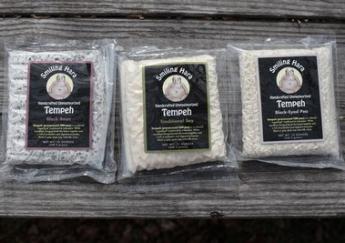I’ve got a puking toddler and a nauseous wife (with diarrhea). The toddler’s symptoms showed up suddenly yesterday as he yacked at a play date (all over a friend’s back). The vomit continued off and on for the rest of the night. This morning Dani said she wasn’t feeling well and has been grabbing sleep in chunks while I attempt to manage the chaos.
It’s a bit funky around here (and not in a George Clinton way) with sheets and blankets in a constant cycle of wash/contaminate. I’m not optimistic about my chances in avoiding whatever this is.
While I focus my daily activities on trying to reduce how many people get sick from foodborne illness, this stuff becomes more personal when my kid is hit with some bug. Who knows whether it’s noro (hopefully) or something more serious – I just hope it runs its course quickly. I feel helpless beyond trying to make him comfortable and smile, post-retch.
Maybe we picked the pathogen up through our dirty kids playing with other dirty kids at the gym childcare, or from my son’s preschool, or maybe it was foodborne. Who knows. But the consequences suck.
There’s a bunch of Salmonella Paratyphi B floating around Western North Carolina linked to Smiling Hara Tempeh (and secondary infections still coming out from folks in contact with or taking care of sick people) and the consequences of this outbreak also suck.
At least 60 cases of salmonellosis (including 8 hospitalizations) along with days of friends and family members caring for and worrying about the ill. I empathize with the helplessness that many of them likely feel. This outbreak, and others affect real people; these numbers aren’t just statistics.
My colleagues at the North Carolina Dept of Ag and Consumer Sciences have fingered the starter culture for the tempeh making process as the source in this outbreak (sounds like it was found in unopened bags).
The finding raises more questions – Who is the supplier? Who else did they sell the stuff to? Did Smiling Hara ask them to test for pathogens (growth of Salmonella and E.coli in tempeh have been documented in the literature). And how many folks who use this starter also make an unpasteurized tempeh product from it?
Beyond the primary players (Smiling Hara and the not-yet-named supplier) Blue Ridge Food Ventures, the shared use kitchen that housed the tempeh production, and also home to more than 20 other businesses, was shut down for a while. Environmental swabs were taken (all negative for Salmonella) and post-outbreak cleaning and sanitizing steps were followed. Big bucks for everyone involved.
Following the starter culture link, Chad Oliphant of Smiling Hara issued a statement saying:
“For us it means that we’ve identified the point of entry. It had nothing to do with our sanitation, protocol or Blue Ridge Food Ventures. It did not originate in Asheville and it was unknowingly passed along to us. So it’s a big relief to us. Now we can look at moving forward — it’s up to the FDA to trace this further.”
During a press conference on May 4th Oliphant was asked if there was anything Smiling Hara is going to do in the future to prevent illnesses like this. He said yes, but said they weren’t sure what changes would be.
For the sake of those customers who became ill (and the secondary infections) here’s some suggestions: demand more proof of microbiological safety from suppliers of starter cultures; let employees and customers know tempeh is a raw product and needs to be treated as such; and develop innovative ways to compel customers about risk-reduction steps.
None of this will likely be a big relief to those affected – getting over symptoms probably will be.
